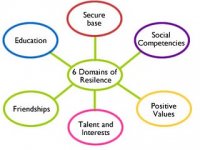David Baxter PhD
Late Founder
Strengths and Resilience, Not Flaws and Damage
August 5, 2010
The label "borderline personality," like all personality disorder diagnoses, can be powerfully disheartening when you are on the receiving end. It seems like an all-encompassing marker for a deeply flawed person. I felt embarrassed by the term at first and was so relieved when a colleague of mine at another school suggested I research the "strengths and resilience" school of thought in Psychology (in place of the focus on assessing damage) and urged me to reframe borderline personality in terms of the gifts of empathy and other emotional strongsuits that come along with this personality organization.

In Jenne' Andrews' recent blog post on Loquaciously Yours - Don't Call Me Borderline - she writes about the destructive power of the term borderline personality disorder in her mother's life and in her own, and about the ways she and her mother both experienced a kind of eclipse of their creative strengths in the face of heavy pressure from the world of psychiatry to accept a view of themselves as terribly sick.
August 5, 2010
The label "borderline personality," like all personality disorder diagnoses, can be powerfully disheartening when you are on the receiving end. It seems like an all-encompassing marker for a deeply flawed person. I felt embarrassed by the term at first and was so relieved when a colleague of mine at another school suggested I research the "strengths and resilience" school of thought in Psychology (in place of the focus on assessing damage) and urged me to reframe borderline personality in terms of the gifts of empathy and other emotional strongsuits that come along with this personality organization.

In Jenne' Andrews' recent blog post on Loquaciously Yours - Don't Call Me Borderline - she writes about the destructive power of the term borderline personality disorder in her mother's life and in her own, and about the ways she and her mother both experienced a kind of eclipse of their creative strengths in the face of heavy pressure from the world of psychiatry to accept a view of themselves as terribly sick.
Please don?t get me wrong, I?m not saying I?ve never worked with people whose inner systems fit the criteria for the DSM categories of Borderline, Narcissism, and others. The difference is that I don?t use the categorical and shaming word ?Personality Disorder? to describe a person?s experience and I don?t view people as fundamentally flawed. Deeply wounded, yes, powerfully protected, yes, but fundamentally and irreparably flawed, no.
I am especially drawn to the implication in her statement above that the "ugly" or "difficult" parts of borderline personality disorder are indicators of a very powerful and, I would add, often self-defeating system of defense mechanisms. I think of borderline personality disorder (or its less intense form, borderline personality organization) as a set of defense mechanisms gone haywire. Little bombs and tripwires and short fiery fuses set up in a circle around us and inside us. I definitely agree with the move to foreground trauma survival, trauma reenactment, and post-traumatic stress syndrome as the emotional musculoskeletal structure of borderline personality disorder. The idea of borderline personality as, also, a set of emotional strengths, resilience, and gifts is the very important other half of the new-and-improved story so many of us are now trying to tell about life with borderline personality organization.
